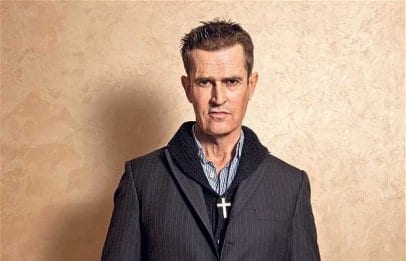
In an interview with The Telegraph, Rupert Everett, who stars in Amadeus at the Chichester Festival Theatre, opens up about Hollywood, his slutty past and how despite leading a more sober lifestyle, if the interviewer offered him a line of cocaine he’d take it . . .
On hypocrisy and homophobia in Hollywood: You can only understand the disaster of your own case yourself. You can’t ever expect the world to see everything about yourself in the way that you do — certainly in terms of conducting a career as a homosexual in showbusiness. Not so much now, maybe, because I’m older. It’s not such a threatening problem. But all through my career it was a huge issue. There’s a whole side of my business now which clicks its fingers for world peace and equal rights. Movie stars and directors and studios spend a lot of money promoting human rights and being charitable in Africa but, actually, in their own backyard, they really don’t accept that any of these things is happening. So people mostly said to me: “Oh, but you’ve been so difficult and you’ve blown everything for yourself, you’ve sabotaged your own career.” To a certain extent, it’s true, but to a certain extent, it isn’t. There’s only a certain amount of mileage you can make, as a young pretender, as a leading man, as a homosexual. There just isn’t very far you can go.
On thinking he had AIDS: Whenever [paparazzi took my picture], I felt incredibly uneasy. That’s probably partly to do with the fact that the whole beginning of my career was when AIDS happened. AIDS in the Eighties was a very, very scary thing. There were people walking around with the disease that looked like the undead. Terrifying. I spent the first six years of my career thinking that any minute now I would probably come out with it. The first 10 years of my career were conducted with this interior hysteria of terror. In one sense, it made everything unpleasant. With every lens, I was wondering if they were going in too tight on what I might be hiding. I was very lucky, considering my very sluttish behaviour, never to get HIV. But I always thought I had it. I can look at films I’ve been in and see in my face this sheer terror.
On the blessing of failure: One of the great things about mine is that it’s been so cyclical, I’ve always been so up one minute and then so down. I learnt pretty quickly there was no point going on with “successful me” when I was being a failure. I learned how to move into “humble me.”
On drugs: I was always very lucky. I was too vain to get into that much trouble. I had this very middle-class work ethic that held me back at the last minute from going on and on and on. Right up until I turned 50, I took, I suppose, what most people would consider a lot. But by a drug taker’s perspective, I really was quite conservative. I’m still probably not in the position to say “no.” If you got out a gram of coke now and offered me a line, I’m sure I’d take one. But I wouldn’t seek one out and I know it’s not going to get me any place much.

 Why you can trust Xtra
Why you can trust Xtra


